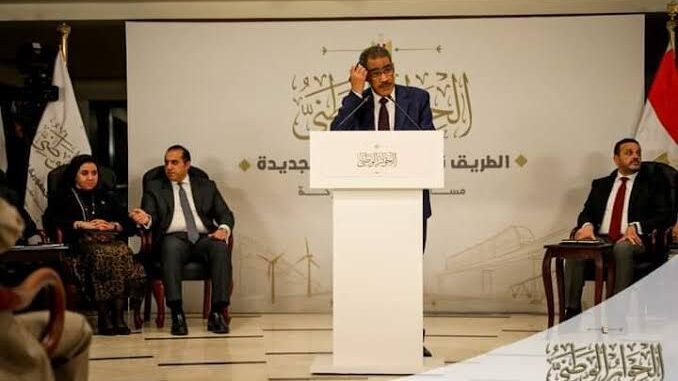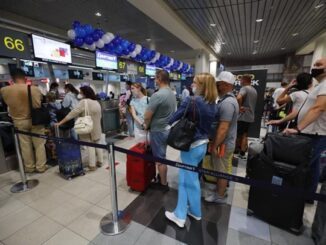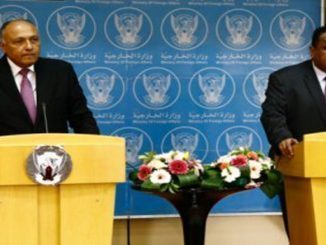
Egypt launched a national political dialogue last Wednesday that authorities said was meant to generate debate around the country’s future, though the chair of the event said several areas of discussion would be off limits.
The dialogue, announced by President Abdel Fattah al-Sisi in April 2022, aims to produce political, economic and social reform recommendations that could be presented for Sisi’s consideration.
It is one of several steps aimed at countering criticism of Egypt’s human rights record. Other measures include a five-year human rights strategy and a presidential amnesty committee that is considering thousands of requests to free some of those jailed under Sisi’s rule.
“I urge you to do the effort to make the national dialogue experience a success,” Sisi said in a recorded message to the dialogue’s opening session, adding that he had followed preparations closely and that “differences in opinion do not damage the cause of a nation”.
The dialogue’s chairperson, Diaa Rashwan, said all sessions would be open to the media but discussions around the constitution, foreign policy and “strategic national security” would be off limits.
Critics say recent steps on human rights are cosmetic, pointing to continuing detentions and arrests of dissidents, and say they doubt the dialogue signals real change.
The dialogue “had nothing to do with actual security practices on the ground,” said Wesam Ata, researcher at the Egyptian rights group Association for Freedom of Thought and Expression (AFTE). “Anyone who does anything that security decides they should be arrested for will be arrested.”
Khaled Dawoud, spokesman for the Civil Democratic Movement, a coalition of secular and leftist opposition groups that are participating in the dialogue, said continuing arrests create “serious doubts” about the government’s commitment to political reform.
The Interior Ministry did not respond to requests for comment.
Rights groups estimate tens of thousands of people including liberal activists as well as Islamists have been jailed since Sisi led the ouster of Muslim Brotherhood President Mohamed Mursi in 2013.
Sisi and his supporters say the crackdown was needed to stabilise the country.
At a Ramadan iftar in April 2022, Egypt’s Abdel Fattah al-Sisi announced the launch of a national dialogue as part of the establishment of a “new republic,” the first time during his presidency that he has called for such a gathering.
Flanked by previously marginalized opposition figures, al-Sisi declared that the dialogue would agree on national priorities to help Egypt transition into a “modern, democratic, civil state that accommodates all its citizens.” He also announced the relaunch of the Presidential Pardon Committee to recommend prisoners for release.
After years of his regime locking up tens of thousands of peaceful opposition members, with the advent of the national dialogue al-Sisi now asserts that “the nation embraces all of us” and that “differences of opinion do not spoil the nation’s affairs.”
Many observers then wondered whether the dialogue would usher in a more positive chapter for regime-opposition relations, or it would end up as another one of al-Sisi’s empty public relations exercises. After over a year in preparation, the second is more likely, amid the regime’s ongoing crackdown.
In an opinion by Halem Henish, a lawyer with the Egyptian Commission for Rights and Freedoms, about the reasons behind al-Sisi’s call for a national dialogue, he stated:
There are several reasons behind al-Sisi’s call for a national dialogue at this time, some of which are local—related to Egypt’s domestic political and economic circumstances—and others that are connected to regional and global events.
One of the main domestic reasons is public discontent over economic conditions during the past few years of al-Sisi’s rule. After years of economic policies that have proved disastrous, al-Sisi and the media he controls are aiming to evade responsibility under the guise of a national dialogue with the opposition and trying to find solutions to the crisis.
Another important point is that indicators suggest that Egypt will soon have to implement extremely harsh economic measures that will cause millions of low-income citizens to suffer. Al-Sisi may want these measures to come as recommendations from the national dialogue so that he does not bear responsibility alone.
Furthermore, al-Sisi is trying to use the national dialogue to improve his international image. He is attempting to mitigate the criticism of him and his regime from Western media and human rights organizations that follows years of closing the public sphere to parties and civic movements.
Yet another important reason that cannot be overlooked is the momentum that the national dialogue has created nationally and internationally, which Egypt will try to leverage to increase external loans and overcome its economic crisis. This situation may allow al-Sisi to make the case to lenders and donors—the most important of them being the International Monetary Fund and the U.S. government—that the country is overcoming its political crises and does not have social divisions, in order to encourage international aid that is conditioned on human rights improvements and the opening of the public sphere, as happens annually with part of U.S. military aid for Egypt.
It also cannot be overlooked that Egypt will be hosting the United Nations Climate Change Conference (COP 27) in Sharm El-Sheikh in November. Al-Sisi is certainly seeking to have the largest number of world leaders possible attend the conference, led by President Joe Biden. Therefore, he wants the appearance of collaboration with the opposition and a polishing of the regime’s image internationally.
All these reasons affirm the purpose of the national dialogue, which al-Sisi is using to escape from his domestic responsibility, especially the economic crisis, and to improve his image externally after years of being described as a dictator by the Western press and human rights organizations. A genuine national dialogue would be an opportunity to resolve Egypt’s political and economic crises. But what I see now is a national “dialogue” that only aims to distract opposition groups from criticizing al-Sisi’s regime, rather than concentrating on finding solutions.



